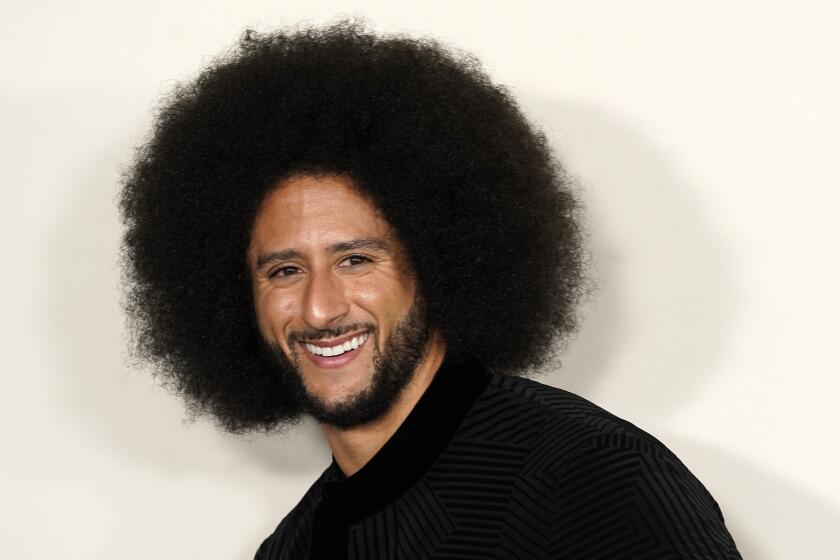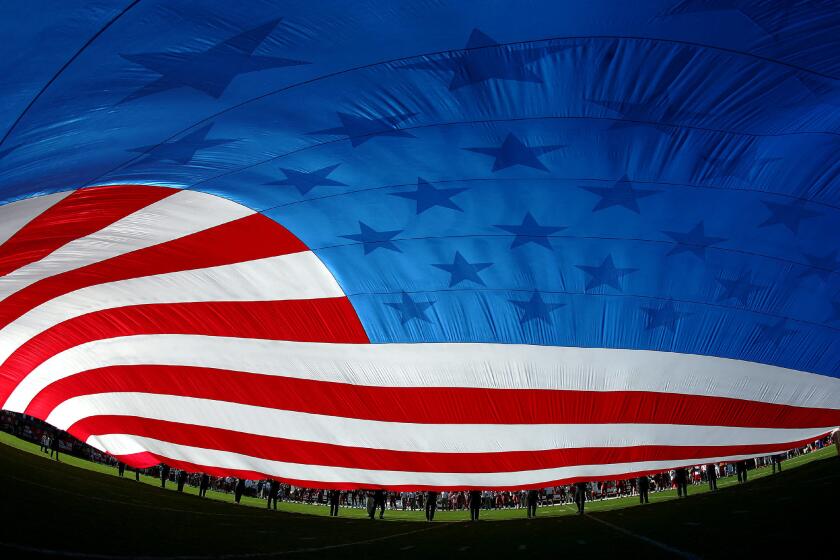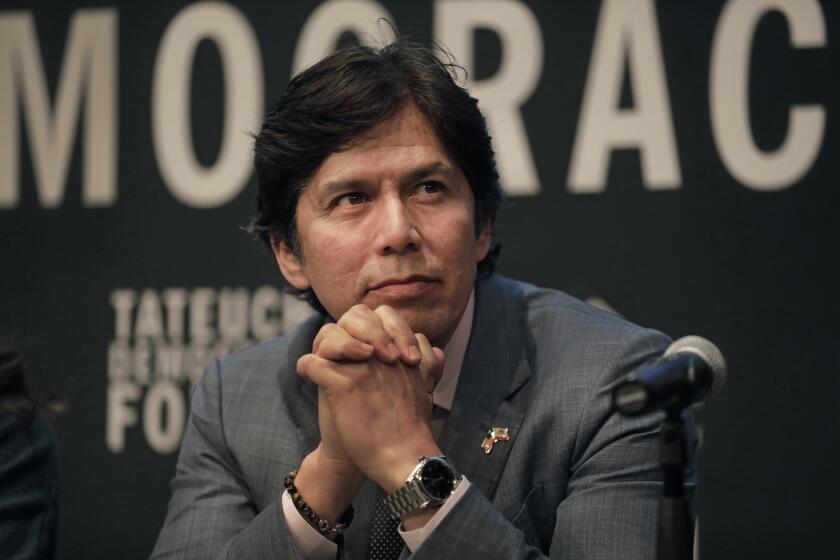Column: Is the Pledge of Allegiance just an empty, performative ritual?

Marissa Barnwell failed to show sufficient deference to the Pledge of Allegiance. And for that, she was punished.
She was walking quietly down the hall at River Bluff High School in Lexington, S.C., where she is in ninth grade. The daily over-the-intercom recitation of the pledge began but Barnwell kept walking.
A teacher called to her several times, she says, but when she didn’t stop to recite the pledge — or at least acknowledge it by standing still — the teacher grabbed her, pushed her up against the wall and eventually sent her to the principal. The principal asked her, “Don’t you love your country?”
Opinion Columnist
Nicholas Goldberg
Nicholas Goldberg served 11 years as editor of the editorial page and is a former editor of the Op-Ed page and Sunday Opinion section.
Barnwell says she has chosen not to pledge allegiance to the flag because she doesn’t believe “liberty and justice” are applied fairly or equitably in the United States.
And that is her right, thanks to the U.S. Constitution. In fact it’s shocking that more than 70 years after the Supreme Court ruled clearly on the subject, there are still teachers who don’t understand that simple reality.
I’d go even further and add that it’s mystifying that the United States, which supposedly prizes freedom of thought, speech and opinion, nevertheless asks its students — including children so young they can’t completely understand the meaning of words like “allegiance” and “indivisible” — to take a daily loyalty oath.
Earlier this month, Barnwell, who says she was inspired by former NFL player Colin Kaepernick, filed a lawsuit in federal court claiming that the school district and certain of its employees violated her free speech rights under the 1st Amendment.
Spike Lee is directing ESPN’s multipart documentary on Colin Kaepernick, which will help the athlete-turned-activist “tell his story from his perspective.”
Unfortunately, Barnwell’s experience is far from unique. It’s just the latest chapter in the long controversial history of the Pledge of Allegiance, a 31-word exercise in performative patriotism that often seems to cause more trouble than it’s worth.
The pledge has long been attributed to Francis Bellamy, a socialist minister who claims to have written it in 1892 as part of, believe it or not, a magazine promotion. As it spread through the nation’s school systems, the pledge was usually accompanied by the so-called “Bellamy salute,” but that was eventually changed because it too closely resembled the stiff-armed fascist salute favored by the Nazis.
Amazingly, it wasn’t until 1943 — more than 50 years after it was written — that the courts finally recognized that, gee, perhaps pledging allegiance is not something we should require of students in a country where the Constitution says government “shall make no law…abridging the freedom of speech.” That year, in West Virginia State Board of Education vs. Barnette, the Supreme Court ruled that Americans can’t be forced to salute the flag or pledge allegiance in public schools.
“If there is any fixed star in our constitutional constellation,” wrote Justice Robert H. Jackson, “it is that no official, high or petty, can prescribe what shall be orthodox in politics, nationalism, religion, or other matters of opinion or force citizens to confess by word or act their faith therein.”
Today, 47 states still require the pledge in public schools (although thanks to the Barnette decision, individual students may opt out). California law requires daily “patriotic exercises” in public schools, and specifies that the pledge is one way to meet that requirement.
When I learned last week about Barnwell’s case, I’d already been thinking about the pledge. That’s because I’d recently read the obituary of Alfred T. Goodwin, a federal appeals court judge who died in late December at age 99.
Goodwin became embroiled in another controversial aspect of the pledge — the ridiculous Eisenhower-era addition of the words “under God.” They were added in 1954, at the height of the Cold War, for only one purpose: to distinguish the U.S. from the godless communists in the Soviet Union.
In 2000, however, an atheist named Michael Newdow sued his daughter’s school district near Sacramento, saying, quite reasonably, that having students recite the words “under God” violated the 1st Amendment because it constituted an endorsement by the government of religious belief.
He said that even though his daughter could opt out of reciting the pledge, that wasn’t enough. The pledge itself, he insisted, was unconstitutional.
L.A. Councilman Kevin De León was asked to deliver the pledge on Tuesday. It was a rough recital.
Incredibly, Goodwin agreed, writing the majority opinion for a three-judge panel at the 9th U.S. Circuit Court of Appeals striking down the recitation of the pledge in public schools, saying it violated the 1st Amendment’s establishment clause.
Goodwin, a Republican and a Nixon appointee, wrote that calling the United States a nation “under God” was every bit as objectionable as calling it a nation under Jesus or Vishnu or Zeus or under no god at all.
It wasn’t a popular ruling, and it wasn’t destined to survive. The U.S. Senate immediately passed a resolution — 99 to 0 — reaffirming the language of the pledge and condemning Goodwin’s reasoning. President George W. Bush called the decision “ridiculous.” The Los Angeles Times called it “fundamentally silly.”
Members of Congress gathered on the Capitol steps to recite the pledge and sing “God Bless America.” More serious critics argued that a passing “acknowledgment” of religion was hardly the same as establishing an official state religion.
In tossing out a California atheist’s challenge, the high court avoids the question of constitutionality. This leaves the door open to similar lawsuits.
In 2004, the Supreme Court reversed Goodwin — not on constitutional grounds, but because it concluded Newdow had lacked standing to bring the case in the first place.
Still, in my opinion Newdow and Goodwin were brave and principled, and right to raise the issues. As a nonbelieving American, I’m put off, to say the least, by the reference to God in the pledge.
While the pledge is hardly our biggest problem, it’s surely an unnecessary and all-too-often empty bit of symbolism. Its purpose is indoctrination. It’s fodder for the culture wars. Too often, it’s merely rote recitation. It’s anti-secular because it’s pro-God.
Marissa Barnwell is right. We should spend less time proclaiming and pledging our devotion to liberty and justice — and more time making those aspirations a reality.
More to Read
A cure for the common opinion
Get thought-provoking perspectives with our weekly newsletter.
You may occasionally receive promotional content from the Los Angeles Times.















